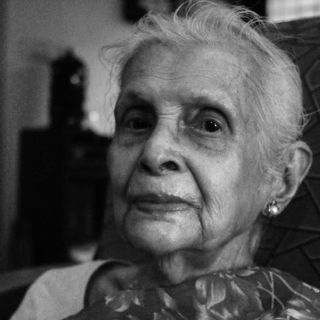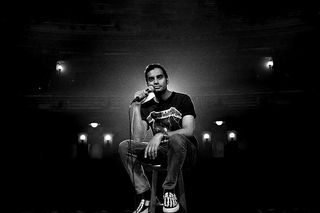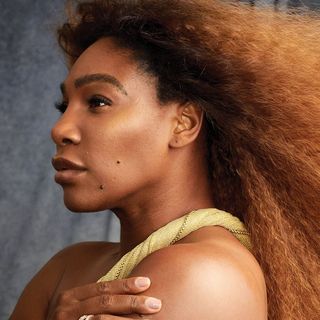
Aziz Ansari Is Not Sorry (or Funny), Just Richer, after ‘Right Now’
Aziz Ansari boasts about all the woke ideas he knows; who cares if he understands them?

Aziz Ansari is back, packaged to the brim with thoughts about woke-ness and his own sexual misconduct case. A Netflix special, Right Now, designed to welcome the beleaguered comedian seeks to restore the image Ansari boasted in his heyday — of the adorable, whimsical Indian-American comic who speaks out unabashedly against all things problematic in society. This time, however, in Right Now, the problematic thing he’s speaking out against, is partially his own self — a concept Ansari is completely blind to.
Since the Babe.net article detailing Ansari’s sexual misconduct made rounds last year, Ansari has issued a series of apologies, none of which signify that Ansari understood the gravity of his actions.He has performed shame for how the woman, who he went on a date with and later tried to coax into sex, perceived his actions. Not once, however, did Ansari take responsibility for the conditioning and ignorance that led him to be blind to her repeated cues rejecting his advances — a practice he continues in his new comedy tour, bolstered by the throngs of welcoming arms that seem to populate his shows.
Related on The Swaddle:
As Aziz Ansari Starts His Comeback, Why Are We So Eager to Forgive Him?
The show begins with Ansari walking to the show in New York as Velvet Underground’s “Pale Blue Eyes” plays in the background — “Sometimes I feel so sad, Sometimes I feel so happy, But mostly you just make me mad,” are words that eerily seem tuned in to what audiences think about him. He goes on to address his sexual misconduct case head on — a move that is at once smart, and transparent in its manipulation. He describes a passerby who came up to him and congratulated him for his Netflix show, but who turned out to be talking about Hasan Minhaj. Horrified at his mistake, the man then identified Ansari and tried to show him he knew the comedian’s work. Master of None? Ansari owns up to it. Parks and Rec? Ansari says yes, that was him. Treat yo’ self? Yes, yes, that was Ansari, too. The dude with the sexual misconduct? No, that was Hasan, Ansari quips. What a shocker.
First of all, it isn’t Ansari’s place to make this joke. Too soon might be an understatement. But how about never? When he hasn’t even owned up to it in reality, the ironic joke is not funny, just pathetic. He goes on to let the audience know how he feels about the situation. “There’s times I felt scared. There’s times I felt humiliated. There’s times I felt embarrassed. And ultimately I just felt terrible that this person felt this way.” The repeated gaslighting aside, this is a tactic Ansari has used before: by dressing up his apology in words that signify shame and reflection, he gets away with not doing the work to achieve either. Then, Ansari takes credit for how his reflections might have made society better: “It’s made not just me but other people more thoughtful, and that’s a good thing.” Ansari hopes he has become a better person (how he went about doing that in his year off is not something he likes to dwell on) and wants to take society a step forward. As he finishes his near-whisper monologue about his feelings about making another woman uncomfortable, he tries to change the mood. That wasn’t the best way to start a comedy show, guys, I know, but it’s important and that’s why it was necessary,he says. Ansari wants the audience to believe he is so invested in woke-ness that he’d risk not getting laughs in the first few minutes of his show, and then he’ll point out that he made that sacrifice. Because it’s important. Which, it is, but damn if I believe he thinks so.
Peppered through his set are information packets about the issues Ansari cares about: America has gone to shit, but “we still have a capacity for listening, understanding,” he says. Is he talking about the American people, or himself? As long as people who, like Ansari, are willing to listen and understand, we will all be okay. That portends a bleak future, to be honest.
He criticizes the exaggerated outrage directed at a white teenager who wore a traditional Chinese attire to her prom, which at the time had incited debates about cultural appropriation. That’s taking it too far, Ansari says. Do you know what’s bad? Saying “Konnichiwa, bitches,” or “Ching-chong bing-bong dress,” Ansari says. While his racist interpretations of what’s racist incite laughter, Ansari puts himself in the safe zone by making the audience know he’s self-aware, which is also the crux of his faux-apology. Ansari has written an entire book about modern romance and has been a progressive comic calling out inappropriate conduct — of course, he knows the language that makes for a compelling (non) apology. As long as he communicates that he’s self-aware, he has to do absolutely no work to make that self-awareness translate into his actions. This well-timed comedy special, the immediate addressing of his apology, the director’s cuts to the audience mulling over his jokes that show the crowd’s fallibility — just like Ansari’s — all work to firmly position Ansari as the not-so-perfect person who is just growing like everyone else. It shows Ansari as merely a mirror to society, not one who has benefited from the way it works.
Related on The Swaddle:
Aziz Ansari and the Black and White (and Grey) of Modern Romance
He criticizes white people’s enthusiasm for glorifying Crazy Rich Asians, implying they do it to for the social capital that liking a movie with Asians accords them; he excoriates those who came out of the woodwork to cancel Michael Jackson and R. Kelly *only* after documentaries detailing the artists’ abuse released; he declares, with apparent irritation in his voice “Gotta be careful about what you say and about what you said.” These comments attack woke culture, which Ansari benefited from before “the whole thing,” as he now likes to call the sexual misconduct incident — but since the culture ‘got him,’ he doesn’t feel too kindly toward it anymore. When he was benefiting from the progressive rhetoric in mainstream discourse when he could wield it as a weapon to bolster his own reputation and career — Ansari was all for woke-ness. Now that the same woke-ness forced him to lay low for a year and voila! A Netflix special laying siege on how woke-ness has been taken too far.
His comeback has been interpreted in several ways, with some staunchly anti-Ansari, and some who want to believe the reformed image he is so anxious to portray. Regardless of how audiences perceive his actions, his right to a return needs to be questioned. There are so many comics who could have gotten this Netflix special — for whom the audience doesn’t need to do the mental labor to absolve or condemn. Does Aziz Ansari have a right to come back to his job? Maybe. Do we have to glorify him when he gets to? No.
Those who lament the passing of the good old days are the ones who benefited by them the most. And Ansari is one of them.
Rajvi Desai is The Swaddle's Culture Editor. After graduating from NYU as a Journalism and Politics major, she covered breaking news and politics in New York City, and dabbled in design and entertainment journalism. Back in the homeland, she's interested in tackling beauty, sports, politics and human rights in her gender-focused writing, while also co-managing The Swaddle Team's podcast, Respectfully Disagree.
Related


There Is No Such Thing as Achievement Through Pure Merit
